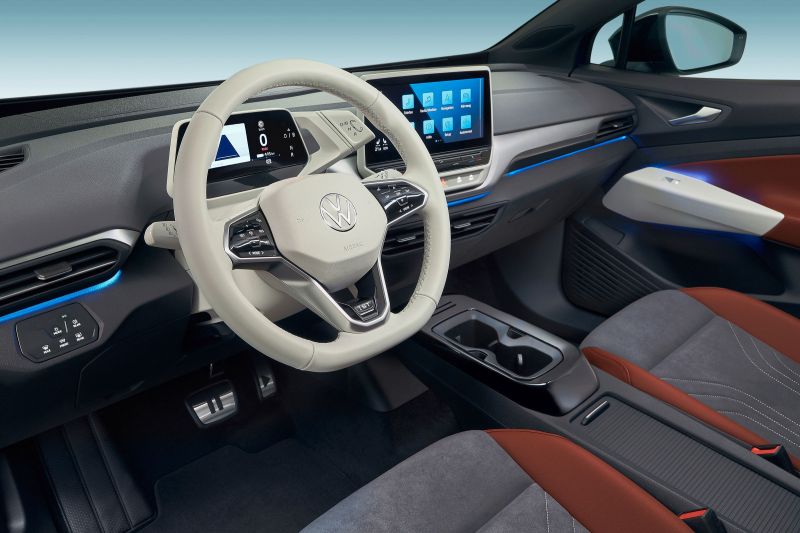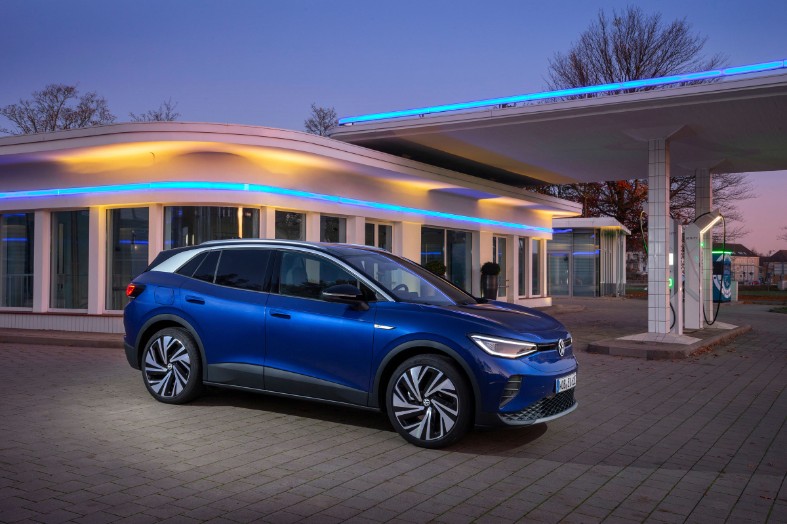Volkswagen's New ID. Family of EVs Will Receive Over-the-Air Updates Every Three Months
【Summary】German automaker Volkswagen intends to be a digital leader in the automotive industry, transforming itself into a full-service provider of software, hardware and digital services for its future vehicles, the company announced on Wednesday. The automaker’s future models will support over the air (OTA) software updates.

German automaker Volkswagen intends to be a digital leader in the automotive industry, transforming itself into a full-service provider of software, hardware and digital services for its future vehicles, the company announced on Wednesday.
The automaker's future models will be software-based, beginning with the new ID. family of electric vehicles. The vehicles will support over-the-air (OTA) software updates, so the vehicles will always have the latest version. Beginning this summer, Volkswagen said that ID. customers in European market will get software updates every three months.
Volkwagen's ID. family includes the ID.3 hatchback and ID.4 SUV. Both vehicles will compete with Tesla's Model 3 sedan and Model Y crossover and others in the growing EV market.
In addition to the vehicle software updates, the OTA upgrades might include new functions and customization options, the automaker said.
"This will ensure that all delivered ID. Models will be kept at the same software level as new cars throughout their entire life cycle. Over-the-Air updates will also be the new normal in cars in the future. With them, we will keep all delivered IDs. models on the same software level as new cars for years to come," says Thomas Ulbrich, Board Member for Technical Development at Volkswagen.
To support Volvkswgen's push into vehicle software, the automaker recently established a "ID.Digital" project unit that will be responsible for the further development of the ID.family and will coordinate the rollout of the OTA updates.
The project team's agile development approach will allow for shorter update cycles that are more flexible based on customer requirements that can be implemented more quickly, Volkswagen said.

The Volkswagen ID.4 fully-electric SUV.
Beginning this week, Volkswagen's ID electric vehicles rolling off the assembly line will come with the company's latest software version 2.1.
Customers with ID. vehicles that have the older version of the software will need to visit a dealer just once to upgrade to version 2.1. After the new update is installed, all of the subsequent updates can be done OTA, according to Volkswagen.
The automaker said that the first OTA updates are currently being tested on over 3,000 company cars to make sure the updates are seamless and problem free before rolling it out to customers.
Electric automaker Tesla Inc. pioneered the use of OTA software updates in the automotive industry and the company has continuously rolled out new software for its vehicles to add new features and improve the battery management software to prevent overheating and extend range.
Volkswagen believes that vehicles with upgradeable software will play a bigger part in a customer's decision when purchasing a new vehicle, which makes sense. Given a choice, car buyers will more than likely purchase a vehicle that supports OTA updates over a vehicle that doesn't.
Speaking at Volkswagen's annual press conference in Wolfsburg, Germany in March 2019, former VW CEO Herbert Deiss said that "software will account for 90 percent of future innovations in the car."
"Today our 20,000 developers are 90 percent hardware-oriented. That will change radically by 2030. Software will account for half of our development costs," Diess said.
Compared to a typical smartphone, a car has ten times as many lines of software code, and a self-driving car will have a thousand times that amount, Diess explained.
He said future Volkswagen models that are capable of autonomous driving will have even more lines of code.
Last year, Volkswagen consolidated some of its software development into a new subsidiary called "Car.Software" to help its development teams to better collaborate. The independent unit is responsible for developing the code for its future vehicles.
Earlier this month, Volkswagen announced that it will use Microsoft's Azure cloud computing services to help the company streamline the development of software for advanced driver assist systems (ADAS) and autonomous driving. Volkswagen is looking to consolidate software development efforts across its brands, including Audi and Porsche, into a cloud-based development environment.
The cloud computing infrastructure built by Microsoft will also help the automaker develop new software more efficiently, allowing the automaker to test and deploy it more quickly via OTA updates.
Volkswagen's Car.Software unit employs around 3,000 people with a budget of more than 7 billion euros ($7.8 billion). The unit will play a significant role in keeping Volkwagen's future software-based vehicles always up to date with the latest software.
-


Ford is Testing a New Robotic Charging Station to Assist Drivers of EVs With Disabilities
-


Ford Raises the Prices of the F-150 Lightning Electric Pickup Due to Rising Raw Material Costs
-


The BMW 7-Series to Feature HD Live Maps From HERE Technologies for Hands-Free Highway Driving in North America at Speeds up to 80 MPH
-


AutoX to Use the 'Eyeonic Vision Sensor' from California-based SiLC Technologies for its Robotaxi Fleet in China
-


LG Develops ‘Invisible’ Speaker Sound Technology That Could Revolutionize In-Vehicle Audio
-


Researchers at South Korea’s Chung-Ang University Develop a ‘Meta-Reinforcement’ Machine Learning Algorithm for Traffic Lights to Improve Vehicle Throughput
-


Zeekr’s New 009 Electric Passenger Van is the World’s First EV to Feature CATL’s Advanced ‘Qilin’ Battery With a Range of 510 Miles
-


Redwood Materials is Building an Electric Vehicle Battery Recycling Facility in South Carolina
- Volkswagen Breaks Ground on the First of Six European Battery Cell Factories as Part of a $20 Billion Investment
- Toyota is Working With the U.S. Dept of Energy to Advance ‘Megawatt-Scale’ Fuel Cell Powered Stationary Energy Generators
- California DMV Accuses Tesla of Making False Claims About its Driver-Assist Systems
- China Added 963,000 Electric Vehicle Charging Piles Since January in its Push to Lead the World in EV Sales
- Hyundai and Michelin to Develop Next-Gen Tires for EVs
- Volvo’s Electric Vehicle Brand Polestar Reports $1 Billion in Revenue in the First Half of 2022, Adds 6 New Global Markets
- Good Time to Buy Into China's EV Industry
- AI-Powered Computer Vision Perception Developer StradVision Closes on $88 Million Series C Funding Round
- Ford Motor Co is Cutting 3,000 Jobs as it Transitions to Electric Vehicles, Software and Digital Services
- China Has Installed Around 4.7 Million Electric Vehicle Charging Poles as of October 2022











 About Us
About Us Contact Us
Contact Us Careers
Careers